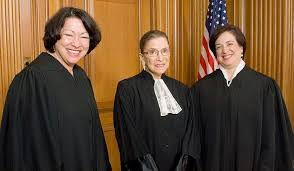Hear ye, Hear ye!
- Emily Duke Hargan

- Sep 29, 2020
- 3 min read
On Saturday, President Trump announced that he was nominating Judge Amy Coney Barrett to replace Justice Ruth Bader Ginsburg. Barrett is a well-qualified replacement—a judge on the U.S. 7th Circuit Court of Appeals, a longtime University of Notre Dame Law Professor, and a law clerk for the late Supreme Court Justice Antonin Scalia.

In her remarks shortly after the President named her, she paid homage to Ginsburg. “I will be mindful of who came before me,” referencing the late Justice’s iconic status as a trailblazer for women’s rights. “She not only broke glass ceilings; she smashed them.”
Yes, Barrett will indeed be a trailblazer. Since the Supreme Court was established in 1789, 114 justices have served on the bench. And in the 231-year history of the Court, less than 3% of those justices have been women.
That 3% is just four glass ceiling shattering women.
Sandra Day O’Connor was the first female Supreme Court Justice. She was appointed by President Reagan in 1981, and confirmed rapidly by the Senate in an unanimous vote of 99-0. She served for 25 years, retired in 2006 and turned 90 this year.

Ruth Bader Ginsburg joined O’Connor on the Court 12 years later in 1993 when she was appointed by President Clinton. The two justices, while not of the same political ideology, were both notably outspoken on the slow progress of women in the law.
Sonia Sotomayor was appointed in 2009, and Elena Kagan the following year in 2010 by President Obama. Justice Sotomayor, the only Hispanic on the Court, is a solid liberal justice known for her fiery opinions. Justice Kagan is often seen as a “bridge-builder” and is often cited for her more pragmatic approach to the law.
Justices Ginsburg and O’Connor, both of whom were born in the 1930s and came of age in the 1950s, had to overcome overt gender discrimination and the competing demands of work and family on their way to the Court. The pathway to the Court for the two younger women justices, Sonia Sotomayor and Elena Kagan, was an easier one thanks to the efforts of the more senior women justices—and this path has been made more so for Amy Coney Barrett.
Barrett will certainly infuse a new character into the Court. At 48 years old, she will be the youngest justice if she is confirmed. She is a dedicated wife and mother to 7 school-aged children. Two of whom were adopted from Haiti, and one with special needs. As the President remarked on Saturday, “Amy is more than a stellar scholar and judge; she is also a profoundly devoted mother.” He continued, “Her family is a core part of who Amy is.”

Frankly, I am in awe of this superwoman that friends and neighbors describe. She has the stunning ability to balance work, motherhood, 5 am Crossfit workouts, and apparently make a delicious crawfish étouffée. I am equally impressed by the testimony and endorsement she has received from her peers —even those with whom she often doesn’t agree. Noah Feldman, a Harvard Constitutional Law Professor and self-described liberal, with whom Barrett clerked with at the Supreme Court writes, “Regardless of what you or I may think of the circumstances of this nomination, Barrett is highly qualified to serve on the Supreme Court.”
Barrett is a conservative thinker and a devout Catholic. Do these qualities inform her thinking? Absolutely. But should they, as some may say, disqualify her from serving on our nation’s highest court? I couldn’t put it better than Noah Feldman—who said, “Constitutional interpretation draws on the full resources of the human mind. These beliefs should not be disqualifying.”
Amy Coney Barrett’s nomination is perhaps a hinge moment for the judiciary. Her record and intellect show that she may join the President’s other appointees in infusing core constitutional principles back into American law and life. She has blazed her own trail in the legal profession and as a judge, and has quite an impressive legal track record to show for it.
Senator Lindsay Graham (R-SC), the Chairman of the Senate Judiciary Committee has announced that the confirmation hearings will begin on October 12th with a vote expected in the Senate by the end of the month of October. Though this confirmation process will be a bitter political battle, it is clear that Amy Coney Barrett is a well-qualified nominee and she deserves full consideration.
Yet let us not forget the four women who have made this moment possible for women jurists like Amy Coney Barrett—all four of them trailblazers, role models, and icons in their own right. Should Judge Barrett be confirmed, she will join what is likely the most elite group of women in the country.








Comments